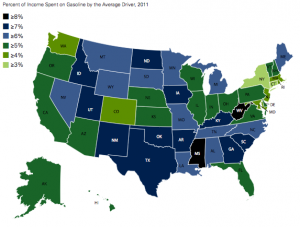4 item(s) were returned.
Chairman of the Energy and Commerce Subcommittee on Energy
U.S. House of Representatives
The House Energy and Commerce Committee recently released a policy paper entitled “Prosperity at Home and Strengthened Allies Abroad – A Global Perspective on Natural Gas Exports.” Over the past year, our committee has analyzed the effects of exporting U.S. liquefied natural gas (LNG) through a series of hearings and an international forum. This report is the culmination of our efforts, detailing the economic and geopolitical benefits of U.S. LNG exports and outlining the actions necessary to realize them. Through our analysis, we found that LNG exports offer the opportunity for the U.S. to improve the domestic economy while providing… [more]
View InsightProfessor of Public Policy
Georgia Institute of Technology
Energy efficiency has been a lightning rod in the debate about the cost of addressing climate change, because it is generally seen as a least-cost approach to mitigating greenhouse gas emissions. But the mere mention of possible “negative costs” associated with energy efficiency is enough to send shock waves across the profession of neoclassical economics. Experts continue to disagree about the magnitude, cost and possibility of managing demand. Some say that the future potential for energy efficiency is limited because markets have already exploited all cost-effective opportunities, and there are insurmountable obstacles to further expansion. Demand-side resources may have played… [more]
View InsightUniversity Distinguished Professor
Michigan State University, Dept. of Chemical Engineering
High energy use (power consumption) increases wealth, health and education levels. Since the beginning of the Industrial Revolution, most energy has come from fossil fuels: coal, oil and natural gas. Whatever the eventual lifetimes of these fossil energy resources, they are not renewable. Sooner or later, fossil energy will not be available to underpin our prosperity. Thus non-renewable energy is not a long-term option. We must have renewable energy if we are to maintain high living standards among advanced economies, and if more people in developing nations are to access enough energy to develop their human potential. But how much… [more]
View InsightNRDC’s recently released report ranks states in two critical areas related to our nation’s continuing addiction to oil: gas price vulnerability – calculated as the percentage of personal income spent on gasoline by the average driver in each state – and state’s adoptions of solutions to reduce oil dependence. The report yields some conclusions: All states are impacted by oil dependence, but some states’ drivers are hit harder economically than others. The top 6 states most vulnerable to gas prices are Mississippi, West Virginia, South Carolina, Kentucky, Oklahoma and Texas, with the average drivers in these states spending 7.3-9% of… [more]
View Insight


